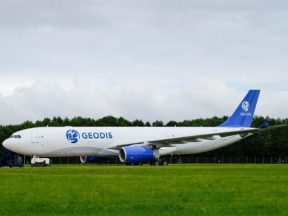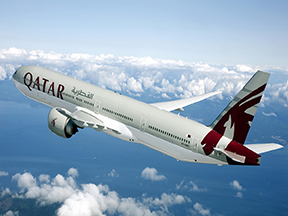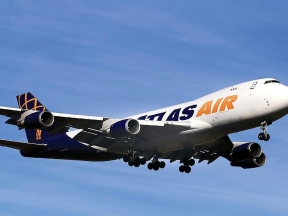Ground handler dnata will invest over €200m investment in a fully automated cargo centre at Amsterdam Airport Schiphol (AMS). The 61,000 sq m dnata Cargo City Amsterdam facility, located at Schiphol South-East, will be capable of processing over 850,000 tonnes of cargo annually. Scheduled to become operational in 2024, the facility will handle all types of cargo, including perishables, pharmaceuticals, dangerous goods, mail, live animals, aircraft engines and vehicles. dnata Cargo City Amsterdam will be developed by Schiphol Commercial Real Estate and equipped by Lödige Industries The cargo centre will be fitted with two separate automated storage and retrieval systems (ASRS), using technology from Lödige Industries, for import and export with twelve stacker cranes. A total of up to 2,500 pallets will be stored here. In addition, separate storage for ULDs will be serviced by four elevating transport vehicles (ETV). dnata will also make use of seven intelligent automated guided vehicles (AGV) from Lödige Industries to enable flexible and scalable ULD transport within the terminal. Smart gates will automatically record the volume and weight of all incoming consignments by scanning them in 3D, thus significantly speeding up handling and improving the quality of service. All elements will be integrated into a warehouse management system to enable dnata to further grow its operations and service at AMS.
Read More »Geodis selects Menzies Aviation for cargo handling at Schiphol
Geodis has awarded Menzies Aviation a cargo handling contract for its volumes at Amsterdam Airport Schiphol. The five-year contract includes cargo handling for the import and export of goods on the forwarder’s Amsterdam flights, operating five times a week. A team of over 20 Menzies Aviation professionals will provide these services to the carrier. Menzies already provides ramp transport services for intact ULDs to GEODIS at the airport. Miguel Gomez Sjunnesson, executive vice president Europe, Menzies Aviation, said: “We are delighted to provide cargo handling services to Geodis at Amsterdam, which is a strategic cargo hub for the carrier. This contract win signifies the high standard and secure service our team has already delivered to Geodis on the ramp. We’re looking forward to building a successful partnership with Geodis over the years to come.”
Read More »IATA certifies Etihad cargo with CEIV for live animal logistics
Etihad Cargo has been awarded IATA’s Centre of Excellence for Independent Validators (CEIV) for Live Animals. The UAE national carrier is the first airline in the Middle East and third globally to hold IATA’s CEIV Live Animals, CEIV Fresh, and CEIV Pharma certifications. The certification was awarded following an IATA-led assessment of Etihad Cargo’s dedicated LiveAnimals, for animal transportation, and SkyStables, for equine transportation, products, as well as its logistics’ audit checklist to ensure compliance with standards, requirements, and Live Animals Regulations (LAR). Martin Drew, Senior Vice President Sales & Cargo, Etihad Aviation Group, said: “The transportation of live animals requires specific conditions and the CEIV certification further underlines Etihad Cargo’s experience and committment to animal welfare and safe transportation. Etihad Cargo is proud to have secured certification for its LiveAnimals and SkyStables products. This recognition further endorses the industry-leading service we provide global customers.” The key benefits of CEIV Live Animals certification include improving animal welfare and safety through appropriate quality and risk management, and enhancing standardisation and professionalism in the handling and transportation of live animals in a multimodal environment. The certification also enforces compliance with the IATA LAR, elevating staff competency through efficient and robust training programmes, and enabling increased collaboration among stakeholders and certified trade lanes.
Read More »Qatar Airways cargo launches CO2 emission calculator
Environmental sustainability and decarbonisation in particular are central to Qatar Airways Cargo’s corporate strategy. In November 2021, it became the first cargo airline to join the IATA CO2NNECT platform and has since been working on developing a fully integrated carbon offsetting solution for its customers. The initial milestone was recently reached with the introduction of a cargo carbon emission calculator. Available under the eServices menu on the airline’s website: https://www.qrcargo.com/calculate-emissions, the calculator quickly determines the shipment’s total CO2 emissions in kilos or pounds, depending on customer preference. The user simply enters the shipment’s origin, destination, flight date, and weight to obtain the different flight options and their respective carbon emissions. “Following our joint Qatar Airways Cargo-IATA project pilot to launch a new voluntary carbon offsetting programme for air cargo shipments, Qatar Airways Cargo is now proud to unveil our Emission Calculator,” Guillaume Halleux, Chief Officer Cargo of Qatar Airways Cargo, announces. “To improve a situation, it is important to establish the status quo. This calculation tool enables our customers to get a better overview their shipments’ carbon footprint with us. It is the first step in our plan to offer a complete offsetting capability as part of the CO2NNECT programme we have entered into with IATA.”
Read More »Atlas Air to expand its charter partnership with Flexport
Atlas Air will expand its charter partnership with freight forwarder Flexport to add a third Boeing 747-400 freighter from September. This long-term charter agreement will broaden Flexport’s network of dedicated freighters to include service from Asia to Los Angeles (LAX), Miami (MIA) and soon, Chicago (ORD). The additional freighter will increase Flexport’s dedicated airfreight capacity from Atlas Air by 50% and allow for “enhanced schedule flexibility” as new origins and destinations are added in 2022 and beyond. “We look forward to enhancing our long-term relationship with Flexport as we continue to support the growth and expansion of its network with dedicated freighters,” said Michael Steen, executive vice president and chief commercial officer, Atlas Air Worldwide. “Atlas Air is strategically positioned to serve Flexport with an unparalleled fleet of widebody freighters and our vast global footprint. Our team is pleased to deliver even more value to Flexport and its customers through the world-class service they can depend on from Atlas Air.” “We’re thrilled to expand our partnership with Atlas Air Worldwide to bring additional capacity to Flexport clients amid a turbulent time in airfreight,” said Neel Jones Shah, executive vice president and global head of airfreight at Flexport.
Read More »Lufthansa Cargo’s Frankfurt operation affected by Omicron
Lufthansa Cargo’s handling operation at its Frankfurt hub has been “significantly” affected by Omicron infections amongst staff. “Loose freight via the Frankfurt hub from US & Canada and Europe (incl. Germany) that has not yet been delivered can unfortunately no longer be accepted by us and transported in a timely manner,” Lufthansa Cargo said. Around 15% of volumes handled at its Frankfurt facility will be affected by the embargo. However, direct deliveries as well as outbound deliveries in Frankfurt are still possible. Certain product groups may also continue to fly, this includes urgent freight (same day shipments), valuable freight, animals, organ donations, mail and temperature-controlled shipments. “Cargo that has already been accepted by us will be handled as soon as feasible,” Lufthansa Cargo added. The carrier also stressed that all shipments routed through its hubs in Munich, Vienna and Brussels are not affected and these facilities are operating normally. “Due to its high transmissibility, the Omicron variant of the Coronavirus continues to keep us on our toes and the infection figures have reached new record levels,” Lufthansa Cargo said.
Read More »Beluga ST freighters to transport private companies cargo
The A300 served as the foundation for the Beluga ST jets, which were followed by the Beluga XL, which was built using six A330s. According to sources, the aircraft which was originally used only for the movement of oversized Airbus components like wings, will now be available as five Beluga ST freighters which can be leased by companies to transport their own capacious cargo. Airbus is reviewing plans to contribute all five of its Beluga STs into chartering outsize freight operations by the mid 2020s. This will eventually result in establishing a new Airbus business to manage this part of Beluga’s operation. Multi-purpose pallet system, portable onboard freight loader and newer outboard platforms are just a trailer of the new ideas being implemented by Airbus to support the new role of Beluga STs. The new multi-purpose pallet system requires minimum modifications regardless of the cargo it holds, and is made up of 2 meter modules with 20cm tie-down points. Similarly, the portable onboard freight loader will be used for less than 12 meters long & 20 tonnes in weight payload.
Read More »GEODIS adds multiple flights to its AirDirect network in Asia-Pacific
In response to surging demand for air cargo capacity in the region, GEODIS, a global leading transport and logistics services provider, has significantly expanded its AirDirect own operated network with three more intra-Asia Pacific (APAC) flight routes. With a newly established hub in Kuala Lumpur, the logistics operator will dovetail the air services with its Road Network linking destinations throughout Southeast Asia. The multi-modal expansion builds on its strong momentum in creating diverse transportation options for customizing supply chain solutions for its customers. The expanded flight network, which bridges Hong Kong, Chennai, Sydney, and Shanghai to Kuala Lumpur, can carry an additional 320 tons of cargo weekly. This will significantly ease the strain on the supply chains, which saw load factors and yields reach historic highs in 2021 when cargo capacity struggled to meet the surge in e-commerce transactions. With demand for airfreight forecast to increase, particularly amidst ongoing delays and flight cancellations across Southeast Asia following the impact of the Omicron variant, GEODIS believes its extended AirDirect schedules will become a pivotal component in ensuring seamless, reliable, and efficient air transport services in the region.
Read More »Strong year for air cargo with year-on-year demand up 18.7% in Dec 2021
The International Air Transport Association (IATA) released data for global air freight markets showing that full-year demand for air cargo increased by 6.9% in 2021, compared to 2019 (pre-covid levels) and 18.7% compared to 2020 following a strong performance in December 2021. This was the second biggest improvement in year-on-year demand since IATA started to monitor cargo performance in 1990 (behind 2010’s 20.6% gain), outpacing the 9.8% rise in global goods trade by 8.9 percentage points. “Air cargo had a stellar year in 2021. For many airlines, it provided a vital source of revenue as passenger demand remained in the doldrums due to COVID-19 travel restrictions. Growth opportunities, however, were lost due to the pressures of labor shortages and constraints across the logistics system. Overall, economic conditions do point towards a strong 2022,” said Willie Walsh, IATA’s Director General. December saw a relief in supply chain issues that enabled an acceleration of cargo growth. “Some relief on supply chain constraints occurred naturally in December as volumes decreased after peak shipping activity ended in advance of the Christmas holiday. This freed capacity to accommodate front-loading of some Lunar New Year shipments to avoid potential disruptions to flight schedules during the Winter Olympic games. And overall December cargo performance was assisted by additional belly-hold capacity as airlines accommodated an expected year-end boost to travel. As shortages of labor and storage capacity remain, governments must keep a sharp focus on supply chain constraints to protect the economic recovery,” said Walsh.
Read More »BLR Airport processes record cargo throughput for 2021
The Kempegowda International Airport, Bengaluru (BLR Airport) recorded its highest-ever cargo tonnage, despite a turbulent pandemic environment. During the Calendar Year 2021 (CY 2021), BLR Airport processed an all-time high tonnage of 406,688 Metric Tonnes (MT) of cargo, recording a significant growth of 28.6% vs. 316,305MT in 2020. This is 7.2% more than the pre-COVID level tonnage of 379,348MT in 2019. International cargo recorded a 32.8% growth, 265,873MT processed, as compared to 200,209MT in 2020. Domestic cargo grew at 21.3%, 140,815 MT processed versus 116,096MT in 2020. The US and Europe continue to be the top trade lanes from BLR Airport. “The tremendous recovery in air cargo is a positive sign for the aviation sector that has been severely impacted by the pandemic,” said Hari Marar, MD & CEO, Bangalore International Airport Limited. “The key factors that contributed to the cargo growth at BLR Airport are our resilient ecosystem that ensured efficient operations round the clock; focus on supply chain efficiencies; conducive geographic location, aided with robust infrastructure and technology; right mix of commodities, and adequate airline capacities to key markets, globally,” Marar added. 13 airlines operate freighters to and from BLR Airport to various domestic and international destinations. Commodities driving the growth are perishables (both agricultural and poultry products), pharma, chemicals and textiles in the exports category, and electronics, heavy machineries, healthcare and life science products in the imports category. Notably, BLR Airport has emerged as the No.1 Airport in the country for perishable exports, accounting for 31.0% of India’s total perishable shipments during FY 2020-21.
Read More » Cargo Breaking News
Cargo Breaking News








